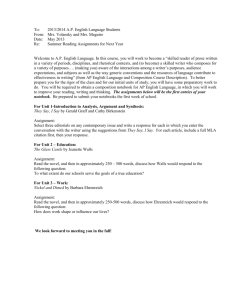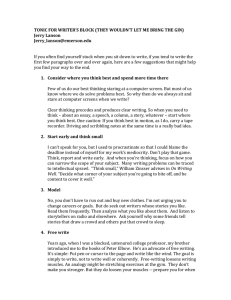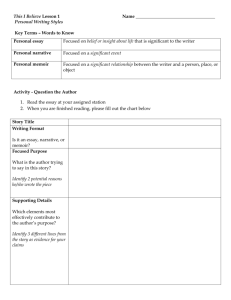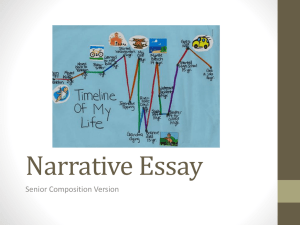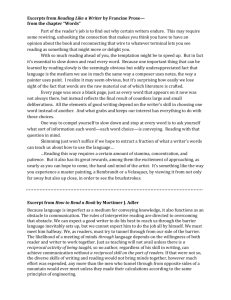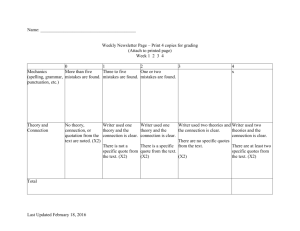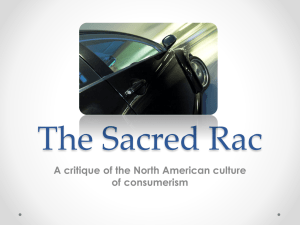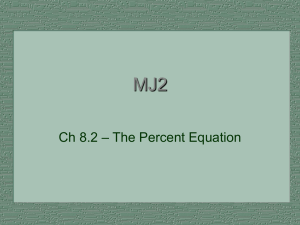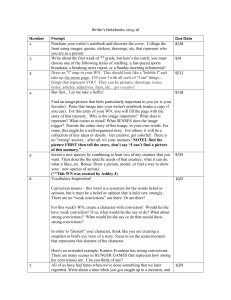Summer Reading IB SL II and HL II
advertisement
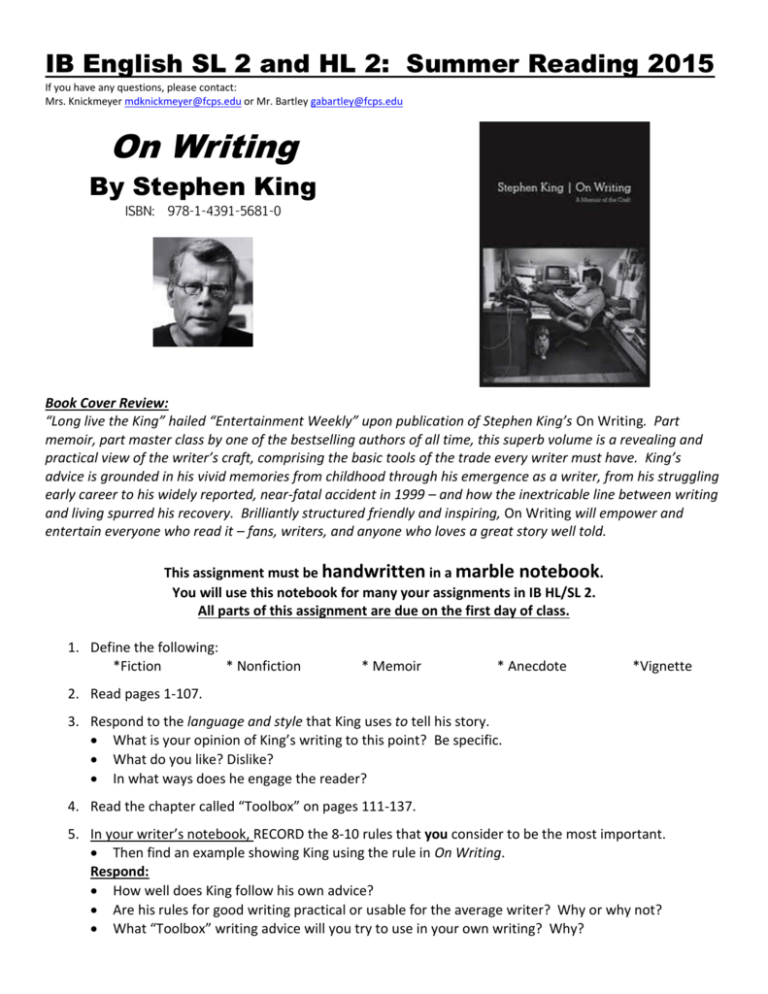
IB English SL 2 and HL 2: Summer Reading 2015 If you have any questions, please contact: Mrs. Knickmeyer mdknickmeyer@fcps.edu or Mr. Bartley gabartley@fcps.edu On Writing By Stephen King ISBN: 978-1-4391-5681-0 Book Cover Review: “Long live the King” hailed “Entertainment Weekly” upon publication of Stephen King’s On Writing. Part memoir, part master class by one of the bestselling authors of all time, this superb volume is a revealing and practical view of the writer’s craft, comprising the basic tools of the trade every writer must have. King’s advice is grounded in his vivid memories from childhood through his emergence as a writer, from his struggling early career to his widely reported, near-fatal accident in 1999 – and how the inextricable line between writing and living spurred his recovery. Brilliantly structured friendly and inspiring, On Writing will empower and entertain everyone who read it – fans, writers, and anyone who loves a great story well told. This assignment must be handwritten in a marble notebook. You will use this notebook for many your assignments in IB HL/SL 2. All parts of this assignment are due on the first day of class. 1. Define the following: *Fiction * Nonfiction * Memoir * Anecdote *Vignette 2. Read pages 1-107. 3. Respond to the language and style that King uses to tell his story. What is your opinion of King’s writing to this point? Be specific. What do you like? Dislike? In what ways does he engage the reader? 4. Read the chapter called “Toolbox” on pages 111-137. 5. In your writer’s notebook, RECORD the 8-10 rules that you consider to be the most important. Then find an example showing King using the rule in On Writing. Respond: How well does King follow his own advice? Are his rules for good writing practical or usable for the average writer? Why or why not? What “Toolbox” writing advice will you try to use in your own writing? Why? 6. Finish reading the book. 7. IN YOUR MARBLE NOTEBOOK: Use the vignettes in On Writing as models and write some of your own. ***Choose any three (3) topics below and write a minimum of 250 words for each.*** INCLUDE A WORD COUNT FOR EACH Be sure to follow the writing advice that King gives you throughout the book and pay attention to the rules you included in your writer’s notebook. Topic choices: Describe your earliest memory. Add sensory details to make the memory vivid. Tell how the memory makes you feel and how it has influenced your life. Describe someone who is important in your life; the description should bring the person to life. Include a specific incident/event to help characterize the person and reveal this person’s importance to you. Explain why he/she is important and/or how the person influenced you. Recount a painful experience that resonates deep inside you and always will. Tell the story. What did you learn from the experience? Explain how the experience has changed you. What is the moment of greatest irony in your life? Describe the moment and what was ironic about it. What did you realize about yourself or about life in general? Describe a source of inspiration that you have in your life. What is it? How does it inspire you? What have you accomplished because of this inspiration? How can you pass it on to someone else? What was the dumbest thing you ever did? What was the result? What did you learn? Tell your story. Tell about an experiment that went terribly wrong (think about the experiment as anything new that you tried to do). Describe the incident/experiment and the failure you experienced. How did the failure affect you? Did you learn anything about yourself from the experience? How will you move forward knowing this? Tell about an incident that changed your life. Describe the event and tell how it changed you. Explain how the incident was a moment of growth for you as a person. What was your first great disappointment? How did you handle the disappointment? What did you learn? Tell about the first time you did something on your own. How did it feel? How did it mark a transition from being a child to becoming an adult for you? Tell about a time you did something that you thought was “good,” but others did not agree. What idea or idea did you challenge? Why did you challenge it? Would you do it again? Tell about a time when persistence paid off. What were the circumstances? Did you solve a problem or figure out something you were wondering about (have an epiphany) or finish a challenging project or defend a position you strongly believed in or simply reach a goal you had set for yourself? What steps did you take to accomplish this? Why was the experience important to you? What is a good piece of advice that your parents gave you? How have you used that advice? How has it helped you? What did you realize about yourself or your parents? What will you tell your children? Describe a prized possession of yours (use lots of detail so we can “see” it). Why is it so special? What does it reveal about you? King’s talent defines him. Do you have an interest or talent that defines you? Tell about it and explain how it defines you. In many ways, King’s childhood influenced his identity and helped him become the writer he is today. What element of your background has helped shaped your identity and the person you are today (and perhaps who you will be in the future)? Tell your story. Challenge: Read another book written by Stephen King or read one of the books he suggests in the back section.
